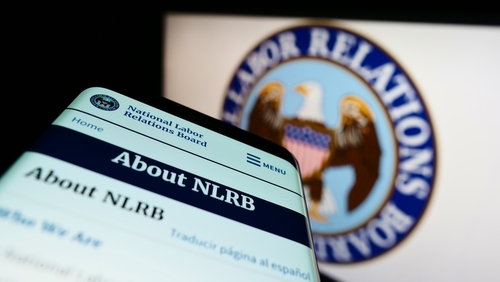Jackson is lone dissenter as Supreme Court allows company to sue union in state court

Image from Shutterstock.
The U.S. Supreme Court’s newest justice was the only dissenter Thursday, when the high court allowed a concrete company to sue a union local in state court for alleged destruction of corporate property.
In a June 1 opinion by Justice Amy Coney Barrett, the Supreme Court ruled that the National Labor Relations Act did not preempt state court litigation against a union local of the International Brotherhood of Teamsters. Justice Ketanji Brown Jackson dissented, describing the majority opinion as a “misguided foray.”
Glacier Northwest Inc. in Washington had sued for conversion and trespass to chattels after its drivers engaged in a work stoppage in August 2017 in the midst of making deliveries with fully loaded trucks. The trucks preserve the concrete in a rotating drum, but time for delivery is limited because the material will begin to harden.
According to Glacier Northwest, at least 16 drivers returned the loaded trucks to the company. Seven took action to protect the trucks, but at least nine others did nothing. In a “mad scramble,” Glacier Northwest offloaded the concrete to prevent truck damage from hardened concrete, Barrett said. Glacier Northwest’s emergency action prevented significant damages to its trucks, but it lost all the concrete mixed for the day.
“The union’s failure to take even minimal precautions illustrates its failure to fulfill its duty,” Barrett said. “The union executed the strike in a manner designed to compromise the safety of Glacier’s trucks and destroy its concrete. Such conduct is not ‘arguably protected’ by the NLRA; on the contrary, it goes well beyond the NLRA’s protections.”
The 1959 Supreme Court case San Diego Building Trades Council v. Garmon held that the NLRA preempts state law, even when the two “arguably” conflict.
“This doctrine—named Garmon preemption after the case that originated it—thus goes beyond the usual preemption rule,” Barrett explained.
Barrett’s opinion was joined in full by Chief Justice John Roberts and Justices Sonia Sotomayor, Elena Kagan and Brett Kavanaugh.
Justices Clarence Thomas, Neil Gorsuch and Samuel Alito concurred in the judgment. Thomas, joined by Gorsuch, called for reexamination of Garmon. Thomas and Gorsuch also joined Alito’s concurrence in the judgment. Alito said the case could be decided in favor of Glacier Northwest without applying the Garmon precedent.
In her dissent, Jackson said the National Labor Relations Board “should ordinarily take the first crack at resolving contentious, fact-bound labor disputes of this nature.”
Jackson noted that an administrative complaint filed by the NLRB general counsel alleged that Glacier Northwest interfered with strike conduct by disciplining drivers.
The complaint “should have marked the end of any court involvement in this matter at this time,” Jackson said.
Steve Vladeck, a professor at the University of Texas School of Law, told CNN that liberal justices Sotomayor and Kagan likely joined Barrett’s opinion because it preserved the Garmon precedent and was based on the narrow facts of the case.
Those facts included “the workers’ intentional misconduct and lack of effort to mitigate the damage,” Vladeck said.
Hat tip to SCOTUSblog.



